If you know a Mormon, you probably have had one of three thoughts: “Their family is so big and they all look the same,” “Why are they so judgmental?”, or “Wow, they sure invite me to a lot of church events.” You might know about the Book of Mormon (the racist Mormon bible of the Americas that essentially erases the real history of Indigenous people, written by a white man in the 1800s). You might know what a Mormon temple looks like. You might even know that they don’t drink, but no one outside of it really comprehends most of what they teach, or why there seems to be a lot of problematic themes.
There’s a reason for the lack of information. The church doesn’t want people to know that it’s actually a cult, so it takes years for even members to slowly find out information about it. Once you’re 12, you start learning a little about church history and what’s expected of adults. You’re taught to strictly adhere to modesty rules, to not drink coffee or alcohol, fast for 24 hours once a month, pay 10% of your income (or allowance in this case) every month to the church, get baptized in place of the dead (yeah), and devote your life to the Gospel. In the summer, you go to week-long camps for your gender and age. Every few years you go on “trek,” which is where you dress up, starve, and recreate the Mormon trek to Utah. It’s a forced thing, and it’s shocking there hasn’t been a lawsuit yet.
You’re also forbidden from making out “passionately” or having sex until marriage. When boys turn 18, they go through the temple for the first time so that they can serve a two-year mission. This is when they find out about temple ceremonies (plagiarized from masonic rituals and complete with bizarre, cult outfits), the teachings about them being the master over their future wives, their secret name (they’re given a name that is said to be their true name in heaven—women are ordered to tell their husbands their names, but husbands can keep theirs a secret), and many more bizarre things.
Women don’t learn about the temple ceremonies or go through it until they are about to get married. They go on to serve a mission only after the age of 19 (it’s not compulsory for girls, so most don’t find out until they’re married). Adults are to attend the temple as much as possible to perform “endowments” for the dead, or rather, marry the dead and make promises on their behalf. To attend temple (which is vital to make it to the Celestial Kingdom—the highest of the three in Mormon heaven), members must obey all the rules, pay their tithing, and sustain their prophets without question. After you attend the temple, you must wear garments at all times (you know, “magic underwear”), and you’re to swear an oath to never talk about what happens in the temple to anyone (not too long ago it was a blood oath). Later in your life, you find out that men are to be the gods of their own planet once they die, and their wife will be merely one of many spirit wives to them in heaven, and they will bear them children and pleasure them for all of eternity. You find out later that having sex is renewing your temple covenants, and so sex is considered a duty on the part of the wife. All that being said, many members never find out that all of this is for nothing, or find out the lies, coverups, and scams of their cult. In fact, most will never know that their church is in fact a cult, which is why it’s so rare to leave it.
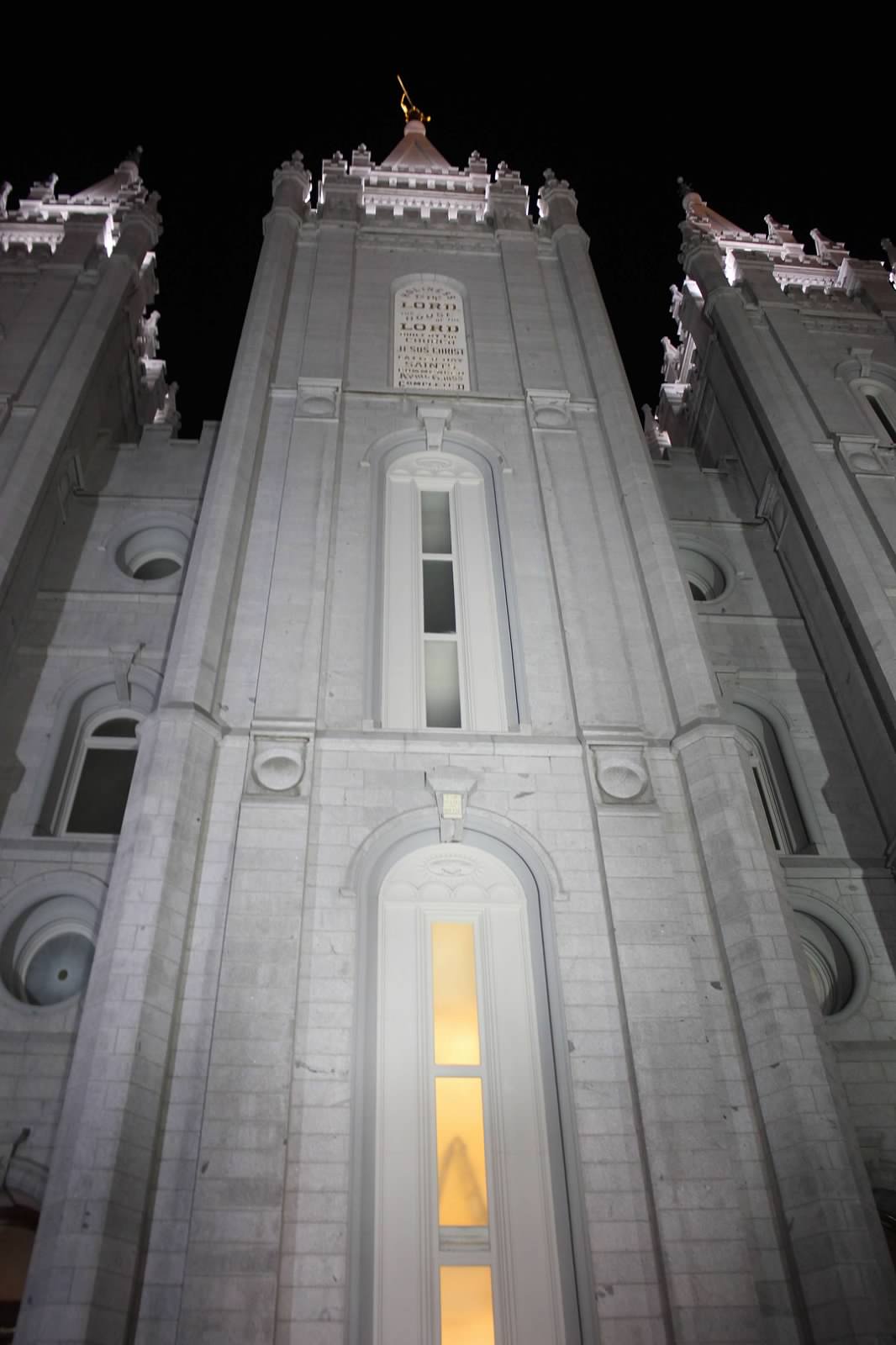
SLC Mormon temple
As a child, I was a “non-member.” My dad’s side was firmly Mormon, and they all lived in Utah. My fourth great-grandfather was Wilford Woodruff, an early “prophet” of the church and founding member. My mother was a convert, and had gotten baptized in order to marry my dad. When I was little, we left the church because my mom read up about the history of polygamy, so I have very little memories that are specific to the church from that time period. I spent most of my life outside of the church, and grateful to not be in it. I didn’t know a lot about the teachings, but it bothered me that the women in the church only ever seemed to do one thing with their lives—get married ultra young, have as many babies as possible, and serve their husbands. I hoped it was a coincidence but I figured the church was old-fashioned in that way. My dad’s side handled our “apostasy” as it’s called (a.k.a. defection) in varying ways, but many didn’t speak to us. They taught their children to not be like us, and later admitted to crying about our “darkness” and “sad lives” when we’d leave their houses (or gas station where we were allowed to meet them), so my siblings and I were not close to our cousins on that side for years. Meanwhile, we were happily living in the San Juan Islands, drinking coffee (something that’s not allowed in Mormonism) and playing outside in our tank tops (also not allowed—women in the church must be covered at all times).
Fast forward to November of my 16th year. My parents decided that we’d join the church again. It’s hard to pin down a specific reason for this, but keep in mind that my dad’s roots were all in Utah and all in the church. Joining again would mean reconnecting with our family and restoring broken bonds with them. My mom also had a special place in her heart for the church. She was a member for years back when she first joined in her twenties, and she loved the focus on families that was such a big a part of the culture. I was terrified when they told me. I thought of the women who all seemed to want the same things and do the same things and think the same things. I was so worried that I wouldn’t be able to follow my dreams. I was an ambitious kid, and I wanted to chase that. Long story short though, after the missionaries came to our house, it was all over for me. They seemed so normal and kind, and it reminded me of what it was like to believe in a god. I was agnostic growing up, so it was suddenly kind of comforting to meet people who were so convinced, but also seemingly normal. So I agreed to get baptized too, and in January, we all did.
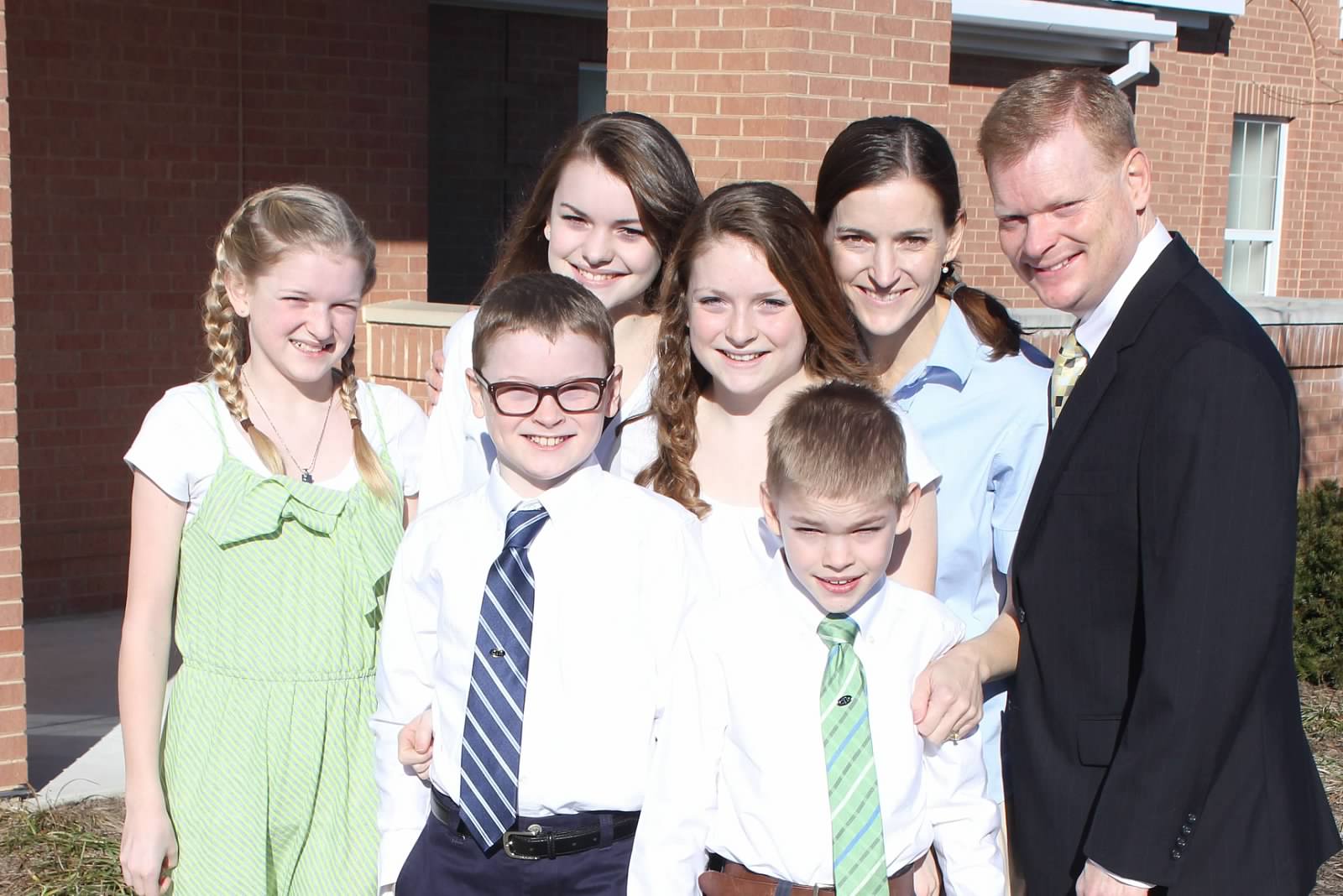
My family gets baptized on this day
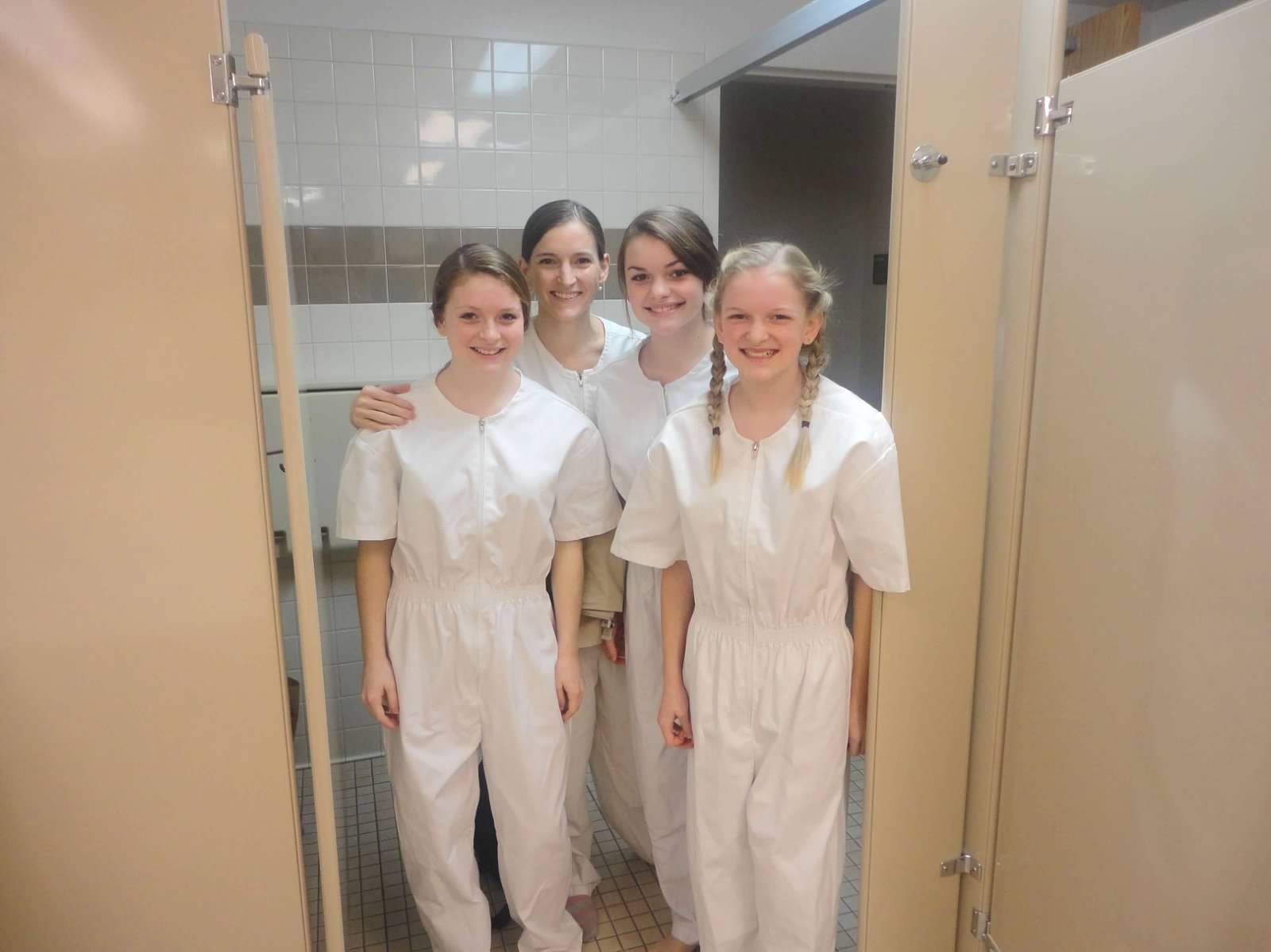
My sisters, Mom, and I get baptized after my brothers.
There were a lot of challenges that came with being in the church. I had to swallow beliefs that were really out there, but when we moved to Utah, it was a lot easier. I was surrounded by pretty much only Mormons. If you’ve ever been to northern Utah (Cache Valley), you understand. It’s rare to meet a “non-member.” The state is run by them, because that’s where they went in the early days when they were run out of towns in Missouri because they were practicing polygamy, stealing other people’s wives, kidnapping daughters, burning printing presses, and raising a militia (something you don’t learn about as a member). So my teachers were all Mormons. My new friends and classmates were all Mormons. Now we lived close to our family on that side (who were now very welcoming), so now every person that we knew, hung out with, or spoke to was a Mormon. Mormon theology was spun into our classwork, and we attended seminary every school day at 6 a.m. I was known as “the convert” at school, and lots of boys wouldn’t go on dates with me because of it. I’d hear rumors that they thought I “wasn’t pure enough” or that they were worried I’d “corrupt the other young women.” I made really good friends in my senior year, but before that it was a lot of having to prove that I was righteous enough to spend time with, despite my heathen roots. All in all though, our individual ward (or congregation at our specific church building) completely embraced us. The Mormon church is a missionary church, so that was not surprising.
I learned quickly that my body was a shameful thing, and that I needed to hide it. We had to buy all new clothes, because Mormonism teaches that women must cover everything, including their shoulders, knees, and chests, and nothing could be too tight. On the flip side, women and girls are encouraged to “embrace their femininity” so the clothes should reflect that too. So we bought loose-fitting jeans, but they were light green. We bought high-necked shirts and long dresses for Sunday, but they were floral or otherwise feminine. Women are not allowed to wear pants to church, so we had to get a lot of clothes and adjust to dressing that way. No one is allowed to get more than one piercing (unless you’re a man—then you can’t get any), get any tattoos, dye your hair unnatural colors, or look like anything besides clean cut. I worked on cultivating a more feminine version of myself, and worked to become less passionate and loud, and more gentle and meek. Looking back, I remember feeling very guilty for wanting a big life and having goals. That all said though, we weren’t miserable or anything. We had community, our family loved us, and it was so fun to go hiking in the mountainous area.

My sisters and me with our Personal Progress medallions a few weeks after baptism.
On top of that, by now we were thoroughly brainwashed. We lived and breathed the church, and that had a lot to do with a quick conversion. We attended our 3-hour church meeting and hours of meetings for your “callings” (work you are called to do for free for the church) and firesides on Sundays (not to mention if you were a visiting teacher, in which case you also had hours of visiting the houses of other members—especially the “weaker” ones who needed to be indoctrinated). Monday nights were for Family Home Evening, which is an evening devoted to church study with your family. On Wednesdays we went to “mutual” all night, which was where teens ages 12–17 went to church and learned more church lessons and participated in activities. Throughout the week we had to prepare for our callings, we went to seminary every day, read our scriptures daily, and we worked on our work books for Young Women (a lengthy process that girls must complete that involves studying and activities that involve preparing to be a good wife and mother someday). If you were assigned a talk for Sunday or there was a ward activity happening (both very frequent occurrences), then that was another chunk of weekly time spent in/for church. The time spent on all of this alone was enough to indoctrinate, but combined with the strict rules, we all swallowed that the church was true and that if we had doubts, that was pride talking. You have songs, scriptures, doctrine, talks, and people hammering into you that “the church is true” (the most commonly used phrase in Mormon culture), and on top of that, we lived in Utah, where if you doubted anything, you thought you were the delusional one since everyone around you is acting like it’s normal. If everyone around you tells you that you’re crazy for long enough, you’ll believe them. You hear songs in church saying “Follow the prophet / Follow the prophet / Follow the prophet / Don’t go astray” and everyone around you cries when they bear their testimony and talk about how true the Gospel is. You don’t have a chance to question it, and you don’t really think to. How could so many people believe in something that isn’t true?

After I graduated, I got a scholarship to BYU (a church university) and my plan was to attend after my mission.
This all may seem very strange to someone who’s never been in the cult, but remember, information is slowly given to you. I didn’t know about the mandatory interviews with male bishops until I joined (you’re asked sexual questions behind closed doors—which is the main reason child abuse is so high in the church). I didn’t know I was to be a spirit concubine to a husband in heaven someday until I went through the temple. What you are taught is taught to you slowly, “precept by precept.” So when I was 19, I decided to serve a mission. I wanted to do good, and I wanted to get out in the world. I was thrilled when I was called to Brazil, because my grandparents and family had lived there on missions and otherwise. The country was a big part of my identity, so I was so overjoyed when I read the letter that told me I’d go there. My family and friends all came to see me open my letter. Everyone was proud of me and I was proud of myself. I felt like I was doing the right thing, and I was beyond thrilled that I’d also get to see the country that shaped my family.

After I opened my mission call to Brazil. A few months later, I attended the temple for the first time.

Here’s me before I went inside the temple for the first time to take out my endowments (what the ceremonies are called). You’re not allowed to look in the bag you’re given ahead of time, which is filled with the strange cult clothing and garments. I left for Brazil a few weeks later.
Mormon missions are not normal missions (sensing a theme here?). Boys go for two years, and girls go for a year and a half. There was to be no contact with the outside world, except you can email your family and loved ones once a week on “P Day.” You can call home on Mother’s Day and Christmas, and that’s it. You cannot use the internet, a phone (except the mission flip phone which is only to be used to contact local members and your leaders), or read or look at or watch anything that isn’t made by the church.

The first time I was allowed to speak to my family in months (Mother’s Day)
You are assigned mission companions who are to remain with you at all times, except when you’re using the shower or toilet. You switch companions every so often, but they’re there to spy on you and you on them. You work together, but you’re taught to keep each other in line. Keep in mind, every male serves a mission. It’s forced. So every male is thoroughly and completely indoctrinated by the time the two years are up. The females who do choose to serve get just as indoctrinated. So I went to the CTM (training center) for a little over a month and learned the lessons I was supposed to teach to “investigators.” We had to wear Sunday clothes at all times along with our name tags, and we were not to be called by our first names again for the rest of the mission. I was Sister Degn, which wasn’t too different, because members in church call each other Sister or Brother (insert last name here). The male missionaries, however, are called Elders. So I learned the language and became fluent during my mission.
It was really hard to be so isolated, and I missed my family so much, but I loved my mission. A lot of missionaries have terrible times on their missions because it’s so hard. You have to be up at dawn and working until late. You’re on your feet, knocking on doors and proselytizing the entire time. That’s your life for those two or 1.5 years. On P Days (Mondays) you get to email home for 30 minutes, but you’re not supposed to go back and forth (or respond if they email you back during those 30 minutes). That’s the day to do laundry, exercise, grocery shop, and relax or go exploring if you want until 3 or 4 p.m. Then it’s back to work. It’s exhausting, especially if you’re learning a new language on top of that. I had a migraine every minute of every day because no one around me knew English and I was spending every ounce of energy to will myself to communicate. Eventually I became fluent, but it was the hardest thing I had ever had to do up until that point. I loved every minute of it. I was getting to understand a new culture, exploring the Brazilian coasts (no swimming allowed, but hiking was approved for us), trying new foods, and being exposed to a beautiful culture. It made the difficulties feel more manageable. I made sure we also fit in volunteer work as well, which we were reprimanded for because it distracted from our duties.
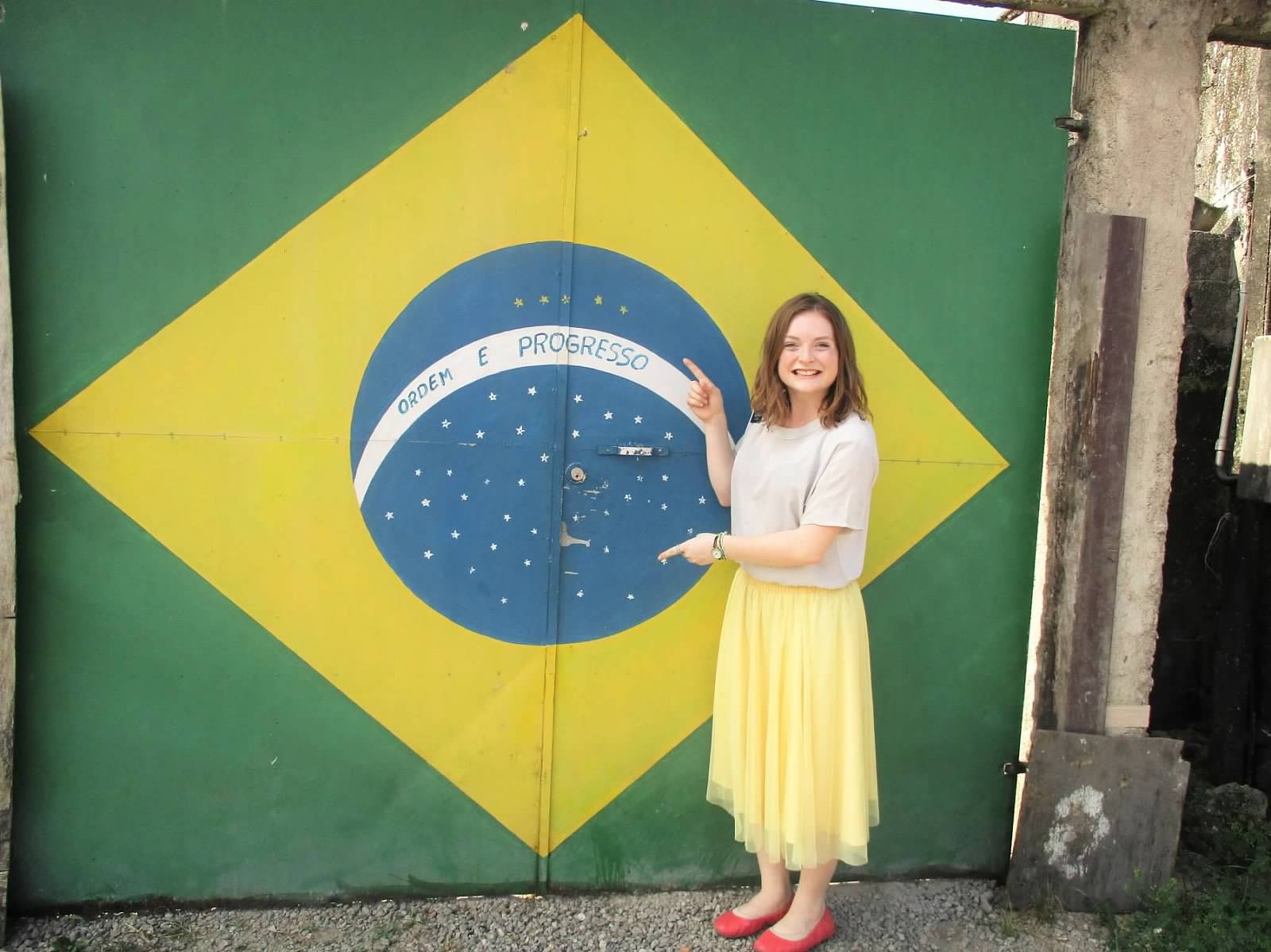
A few weeks in the mission field in Brazil.
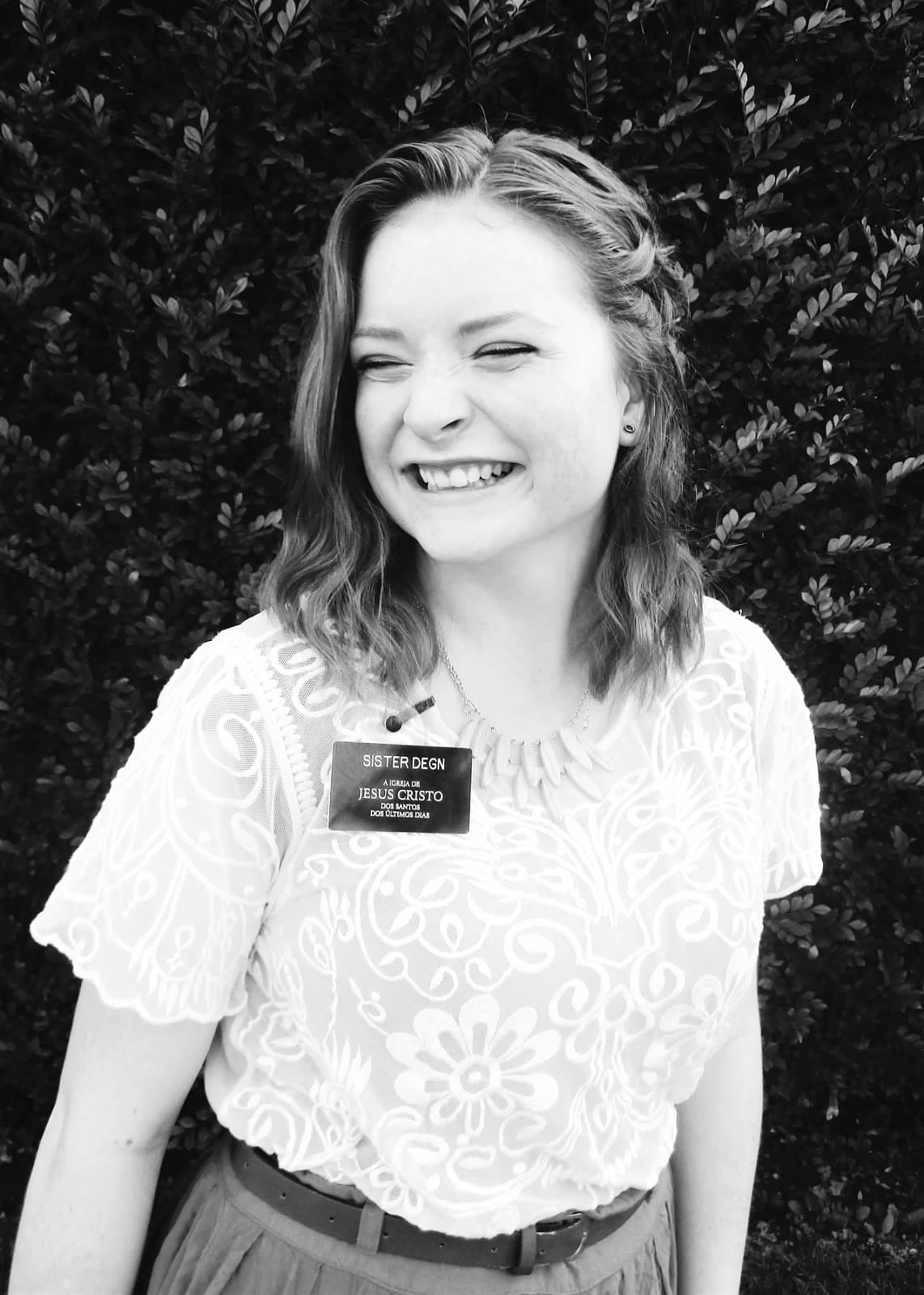
I didn’t struggle on my Mormon mission. I was a happy missionary.
One day, I got a call from my mission president (which doesn’t happen—he’s too high up to be randomly calling missionaries working for him). He said my mother was “very insistent” on talking to me. I was really concerned, because again, no communication with the outside world allowed. He said he’d pick me and my companion up in the morning to drive to the city and talk to her. He told me to calm her down and get back to work, so I was really nervous about what would happen. In the morning, when we got picked up and started driving to Santos, the entire drive was a giant lecture. They wanted to make sure I’d make my mom feel better and I could get back to normal. I had no doubt that I’d go back to normal, and I was expecting her to just be missing me or something. I loved being on my mission, and despite it being hard, I felt a huge sense of accomplishment. Also, by then, this was my home. Brazil was home, and I was dreading the thought of ever leaving. I had no idea I’d be leaving that night.
When I got on the phone with my mom, I knew the president and other leaders would be listening nearby, so I answered calmly. My mom and dad were on the other line. It felt so good to hear their voices, but I was determined to stay. That was when my world broke open. My mother told me that she had found out that Joseph Smith, the founder of the religion, had married 14-year-old girls. She said that she found out that the polygamy that we were taught was necessary and non-sexual and only involving widows, was actually happening with him and teenagers. She told me of the records of him forcing young girls into marrying and having sex with him, and how he also married already married women by threatening them or sending their husbands off on missions. She also told me that she found out that “the first vision,” the one I was teaching to members, the story of how Joseph Smith was spoken to by God and angels and told to restore the “true church” was actually a later edit of the true story, which was a story that he wrote as an adult about how when he was 14 years old he prayed to be forgiven of his sins and he had a good feeling come over him. I felt sick. I had just been teaching a false story to hundreds of families and vulnerable people, and not only that, but I realized that everything I based my beliefs, values, personality, desires, and thoughts on was all a lie, and built by a pedophile rapist. I was so scared, but I knew I needed to leave. It broke my heart to leave the country, but I couldn’t stay and pretend I didn’t learn what was really going on. I told my parents I’d find my way back to the States, and that I’d call them from a stranger’s phone when I landed stateside. They had already packed up the house and were staying in a hotel by the airport back in Salt Lake City in the hopes that I’d come home and we could all start over. They wished me luck and told me they loved me.
The following hours were the hardest of my entire existence. To make a very long story short, I spent hours pleading with the president and leaders to give me my papers and fly me home, all to be met with spiritual blackmail, shaming, name calling, and refusal. When it was clear that I wouldn’t leave without my paperwork and ticket home, they agreed. I was traumatized but I wouldn’t let them see that. They begrudgingly got me a ticket for flight that they were sure I’d miss. I had to leave almost all of my things behind because I didn’t have time to pack, and they dropped me off at a random bus station. I had to find my own way to the Sao Paulo airport, and figure out how to get to my gate. I did find it thanks to a kind French man (thankfully I spoke a little French and he spoke a lot of English) and me tossing a lot of the weight I was carrying in the trash—including my temple garments and church manuals. I put on regular clothes for the first time in a long time, and pulled up my hair. I felt really good. Scared, but strong. I remember looking at myself in the airport bathroom mirror and breathing deeply for the first time that life-changing day. I knew I had to leave. So I picked up my bag, and a few minutes later I was on a plane over Sao Paulo, ordering my first wine.
I will never be able to put into words the emotions I felt right before I reunited with my family. It was a lot to process, and the trauma and hurt of leaving Brazil was a lot to bear. That all said, I felt relief for knowing the truth, no matter how hard it was to learn about, and I was so happy to hug my family again. I cried as I saw that my little brothers had sprouted up when I was away, and my dog had gotten little white hairs around her eyes. My sisters beamed and tackled me in the biggest group hug, and my parents held my face and told me they were proud of me.

Reuniting with my family as nonmembers.
Since leaving four years ago, I have since learned of many other Mormon lies. I learned about the violence, rape, and coercion of the early history. I learned about the church’s strong stance against desegregation and ties to the KKK. I learned about how the church teaches that Black people would be servants in heaven, and that early Mormons were sealed to their slaves and servants “for time and all eternity” through the temple rituals. I learned about the handshakes and rituals in the temple being stolen from Masonry. My eyes were open to the homophobia and blatant sexism that I had not fully understood while inside it, and the frauds committed by Joseph Smith before he even started the mormon cult. It was a lot to take in, and it was horrifying to feel so duped. Once again, many in our family stopped talking to us, and this time I lost 99% of my friends. I was bullied, harassed, threatened, and preached to by members in their efforts to save me or at least teach me a lesson. I learned to get very good at advocating for myself and standing up for myself. I learned to drop people from my life who were hurting me or supporting oppression, and I learned to open my mind once again. In the church, you’re taught that people who leave it are dark, crazy, disobedient, lost, or bad people. I’ve never been happier or more whole. I don’t need a manual for life, and I don’t need men to be in charge of me. I’m in charge of myself, and I don’t have to limit myself to marrying as young as possible and forcing out as many children from my body as I possibly can. I don’t have to accept solely male leaders, pay them, let them ask me about my sexual habits, or obey them.

My first time in years showing my shoulders and thighs- a week after I left my mission.
The Mormon church is a cult. It checks off every box on any cult requirement list. People often don’t understand that because they are not allowed in these temples, members don’t tell you the weird and harmful teachings, and who’s going to sit down and figure out how much time is spent by leaders indoctrinating members and themselves? Members don’t understand that it’s a cult, because that’s the beauty of a cult. You’re brainwashed, and you’re told that everyone else is crazy or lying. It doesn’t matter what evidence you show them, even if it’s proof from their own organization or words from their own prophets. They won’t believe you– believe me, I’ve tried. It’s rare to wake up from this, and I don’t know if I ever would have had my mom not called me and been so blunt with me with proof and evidence. It helps that I was a convert, but I was just as brainwashed as everyone else. I’ve had close friends leave the church too when they saw evidence or woke up about the injustice (the church is unsurprisingly also very against homosexuality and it’s causing a lot of suicides in the state of Utah). It’s not impossible to leave or to get out of it. It’s just traumatizing.
If you know someone who’s mormon, don’t let them take you to church events. Don’t affirm their faith. It’s oppressive, harmful, sexist, abusive, homophobic, violent, racist, and among other things- proven to be false. Be upfront with them, and share resources with them like the CES Letter. If you know an ex-Mormon (while rare, it does happen), be kind to them. No matter how they left, it was traumatizing, and probably the hardest thing they’ve ever done. They’ve most likely lost loved ones and family and even their job or scholarships because of it. Ex-Mormons have to adjust and rebuild their entire lives, so be patient with them and let them know that you’re a safe space. The mormon church is excellent with marketing, so many assume it’s just a slightly strange but happy family filled religion. It’s not. It’s dangerous and it ruins lives, even if the members don’t understand that that’s what’s happening to them. Exmormons are told to leave quietly with their tails between their legs. If any of us speak up about what we found out, we are further ostracized and lose the few people who didn’t drop us when we left in the first place. Exmo’s deal with high rates of religious based PTSD, chronic shame/guilt, and many other issues that come with leaving a high demand cult. Give them resources, and be a listening ear. It can be embarrassing to talk about, because once you wake up, it’s really hard to not see how obviously wrong it was the entire time. Many don’t reveal that they used to be mormon because of this. Be a friend, and let them know you have their back. Sometimes having someone to vent makes all the difference in the world.
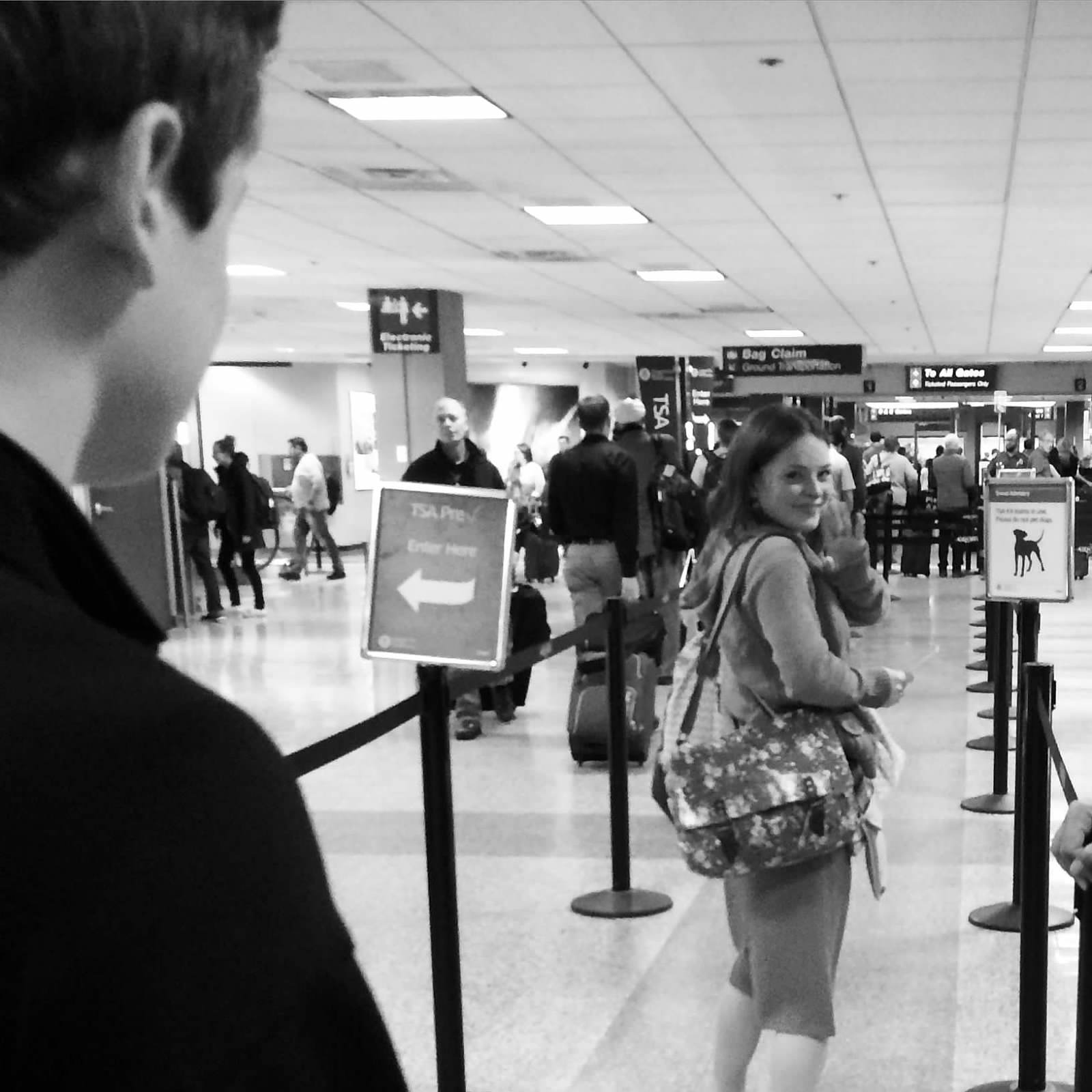
The last time I saw my family as I left for my mission. It was the last time we would all be together as Mormons. Everything changed the next time we saw each other.
It took me years to go public about all of this, but better late than never. So, if you get one thing out of my story, I hope it’s to never stop questioning. Don’t ever let someone tell you to be submissive, and never let your curiosity die. Be the black sheep. Be the dissenter. Don’t listen to gaslighting. Be the person who gets others to ask “Why,” and don’t ever feel guilty for listening to your gut. That gut feeling is there for a reason.
Get more like this—Sign up for our daily inspirational newsletter for exclusive content!
This article was originally published on September 20, 2020 and updated on March 28, 2023.
__
Photo: Emily Iris Degn




